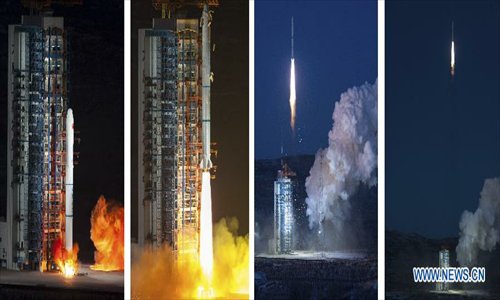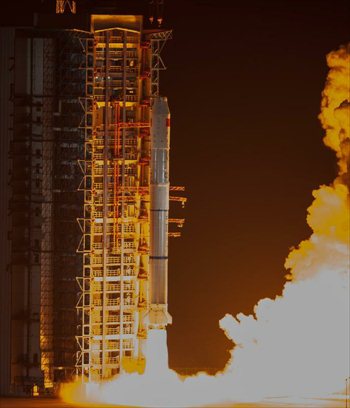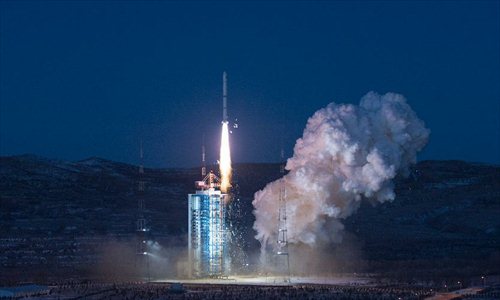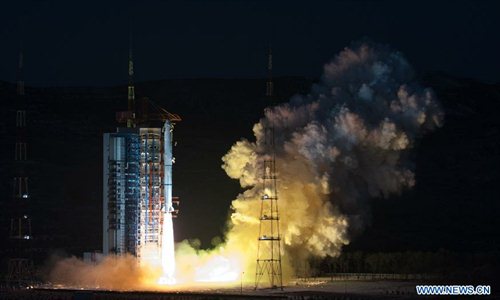HOME >> SCI-TECH
China launches environment-monitoring satellite Huanjing-1C
Source:Xinhua Published: 2012-11-19 10:53:24

Combination photo taken on November 19, 2012 shows Long March-2C carrier rocket carrying an environment-monitoring satellite Huanjing-1C blasting off from the launch pad at the Taiyuan Satellite Launch Center in Taiyuan, capital of north China's Shanxi Province. The Huanjing-1C satellite and the other two satellites Huanjing-1A and Huanjing-1B, which were sent to the outer space in 2008, will be used to monitor the environment and help reduce natural disasters. Photo: Xinhua

Long March-2C carrier rocket carrying an environment-monitoring satellite Huanjing-1C blasts off from the launch pad at the Taiyuan Satellite Launch Center in Taiyuan, capital of north China's Shanxi Province, Nov. 19, 2012. The Huanjing-1C satellite and the other two satellites Huanjing-1A and Huanjing-1B, which were sent to the outer space in 2008, will be used to monitor the environment and help reduce natural disasters. Photo: Xinhua

Long March-2C carrier rocket carrying an environment-monitoring satellite Huanjing-1C blasts off from the launch pad at the Taiyuan Satellite Launch Center in Taiyuan, capital of north China's Shanxi Province, Nov. 19, 2012. The Huanjing-1C satellite and the other two satellites Huanjing-1A and Huanjing-1B, which were sent to the outer space in 2008, will be used to monitor the environment and help reduce natural disasters. Photo: Xinhua

Long March-2C carrier rocket carrying an environment-monitoring satellite Huanjing-1C blasts off from the launch pad at the Taiyuan Satellite Launch Center in Taiyuan, capital of north China's Shanxi Province, Nov. 19, 2012. The Huanjing-1C satellite and the other two satellites Huanjing-1A and Huanjing-1B, which were sent to the outer space in 2008, will be used to monitor the environment and help reduce natural disasters. Photo: Xinhua
China on Monday sent the third satellite in its "Environment I" family into the sky, sharpening its abilities in environmental monitoring and disaster forecasting.
The launch marks the completion of a plan initiated by China in 2003 to create a small environmental monitoring satellite constellation, according to north China's Taiyuan Satellite Launch Center.
The radar satellite will join the other two operating optical satellites "Environment I" satellites, which were launched in Sept. 2008, to form a network covering most of China's territory.
This "2+1" formula will help provide scientific evidence for assessing natural disaster situations, emergency aid and reconstruction as well as enable China to monitor and forecast ecological changes, pollution and natural disasters around the clock, the center said.
The satellite was carried by a Long March 2C rocket.
The rocket also carried two additional satellites designed to run tests and carry out in-orbit experiments for new-type aerospace equipment, materials, methods and miniature satellite platforms.
The launch marks the completion of a plan initiated by China in 2003 to create a small environmental monitoring satellite constellation, according to north China's Taiyuan Satellite Launch Center.
The radar satellite will join the other two operating optical satellites "Environment I" satellites, which were launched in Sept. 2008, to form a network covering most of China's territory.
This "2+1" formula will help provide scientific evidence for assessing natural disaster situations, emergency aid and reconstruction as well as enable China to monitor and forecast ecological changes, pollution and natural disasters around the clock, the center said.
The satellite was carried by a Long March 2C rocket.
The rocket also carried two additional satellites designed to run tests and carry out in-orbit experiments for new-type aerospace equipment, materials, methods and miniature satellite platforms.
Posted in: Air & Space